初中结果状语从句讲解
语法小知识:结果状语从句详解
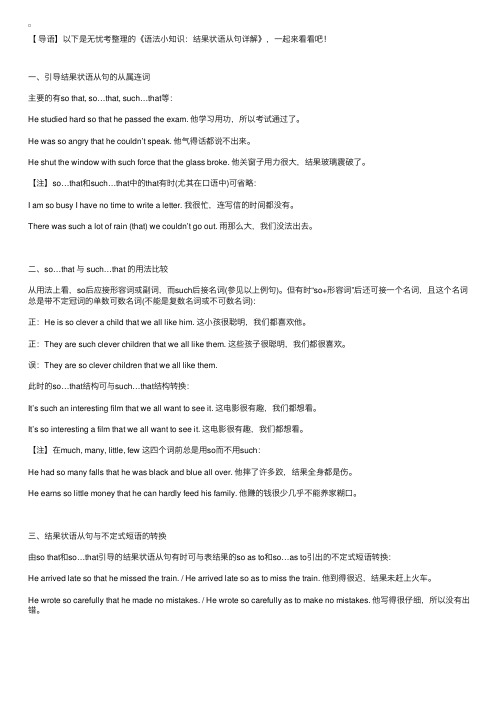
【导语】以下是⽆忧考整理的《语法⼩知识:结果状语从句详解》,⼀起来看看吧!⼀、引导结果状语从句的从属连词主要的有so that, so…that, such…that等:He studied hard so that he passed the exam. 他学习⽤功,所以考试通过了。
He was so angry that he couldn’t speak. 他⽓得话都说不出来。
He shut the window with such force that the glass broke. 他关窗⼦⽤⼒很⼤,结果玻璃震破了。
【注】so…that和such…that中的that有时(尤其在⼝语中)可省略:I am so busy I have no time to write a letter. 我很忙,连写信的时间都没有。
There was such a lot of rain (that) we couldn’t go out. ⾬那么⼤,我们没法出去。
⼆、so…that 与 such…that 的⽤法⽐较从⽤法上看,so后应接形容词或副词,⽽such后接名词(参见以上例句)。
但有时“so+形容词”后还可接⼀个名词,且这个名词总是带不定冠词的单数可数名词(不能是复数名词或不可数名词):正:He is so clever a child that we all like him. 这⼩孩很聪明,我们都喜欢他。
正:They are such clever children that we all like them. 这些孩⼦很聪明,我们都很喜欢。
误:They are so clever children that we all like them.此时的so…that结构可与such…that结构转换:It’s such an interesting film that we all want to see it. 这电影很有趣,我们都想看。
结果状语从句的构成与意义初中语法指南
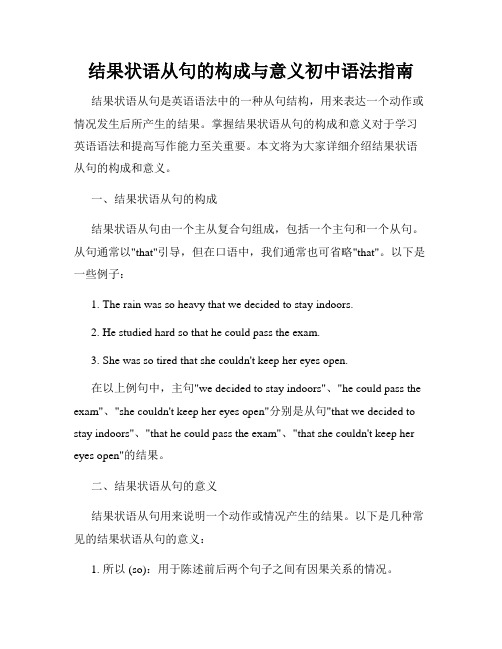
结果状语从句的构成与意义初中语法指南结果状语从句是英语语法中的一种从句结构,用来表达一个动作或情况发生后所产生的结果。
掌握结果状语从句的构成和意义对于学习英语语法和提高写作能力至关重要。
本文将为大家详细介绍结果状语从句的构成和意义。
一、结果状语从句的构成结果状语从句由一个主从复合句组成,包括一个主句和一个从句。
从句通常以"that"引导,但在口语中,我们通常也可省略"that"。
以下是一些例子:1. The rain was so heavy that we decided to stay indoors.2. He studied hard so that he could pass the exam.3. She was so tired that she couldn't keep her eyes open.在以上例句中,主句"we decided to stay indoors"、"he could pass the exam"、"she couldn't keep her eyes open"分别是从句"that we decided to stay indoors"、"that he could pass the exam"、"that she couldn't keep her eyes open"的结果。
二、结果状语从句的意义结果状语从句用来说明一个动作或情况产生的结果。
以下是几种常见的结果状语从句的意义:1. 所以 (so):用于陈述前后两个句子之间有因果关系的情况。
例如:The weather was bad, so we stayed at home.意思是:天气很坏,所以我们待在家里。
2. 如此……以至于 (so...that):用于说明一个原因导致另一个更严重的结果。
初中英语知识点归纳结果状语从句
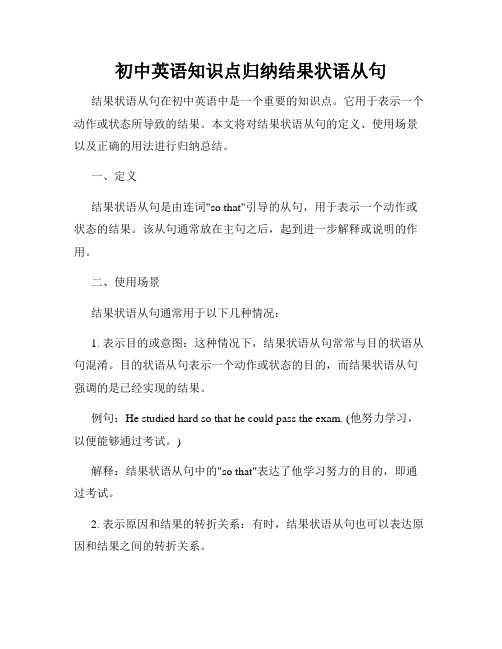
初中英语知识点归纳结果状语从句结果状语从句在初中英语中是一个重要的知识点。
它用于表示一个动作或状态所导致的结果。
本文将对结果状语从句的定义、使用场景以及正确的用法进行归纳总结。
一、定义结果状语从句是由连词"so that"引导的从句,用于表示一个动作或状态的结果。
该从句通常放在主句之后,起到进一步解释或说明的作用。
二、使用场景结果状语从句通常用于以下几种情况:1. 表示目的或意图:这种情况下,结果状语从句常常与目的状语从句混淆。
目的状语从句表示一个动作或状态的目的,而结果状语从句强调的是已经实现的结果。
例句:He studied hard so that he could pass the exam. (他努力学习,以便能够通过考试。
)解释:结果状语从句中的"so that"表达了他学习努力的目的,即通过考试。
2. 表示原因和结果的转折关系:有时,结果状语从句也可以表达原因和结果之间的转折关系。
例句:He was sick, so that he couldn't attend the party. (他病了,所以不能参加聚会。
)解释:结果状语从句中的"so that"表示了他病了的原因,导致了他无法参加聚会。
3. 表示某个结果的必然性:在某些情况下,结果状语从句也可以用来表达一种必然或不可避免的结果。
例句:The car was old and poorly maintained, so that it broke down on the way. (这辆车年代久远,保养也不好,结果在途中抛锚了。
)解释:结果状语从句中的"so that"表示了车子抛锚的必然结果。
三、正确用法在使用结果状语从句时,需要注意以下几点:1. 连词的用法:结果状语从句常由连词"so that"引导,同时该连词后面还需要跟一个完整的句子,而不是短语或独立的部分。
结果状语从句
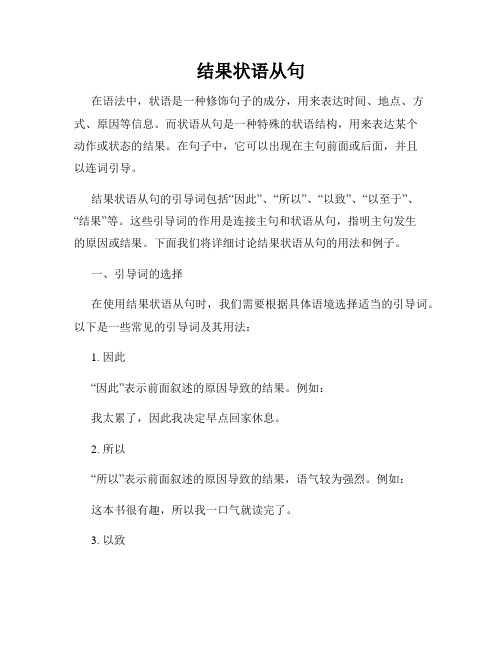
结果状语从句在语法中,状语是一种修饰句子的成分,用来表达时间、地点、方式、原因等信息。
而状语从句是一种特殊的状语结构,用来表达某个动作或状态的结果。
在句子中,它可以出现在主句前面或后面,并且以连词引导。
结果状语从句的引导词包括“因此”、“所以”、“以致”、“以至于”、“结果”等。
这些引导词的作用是连接主句和状语从句,指明主句发生的原因或结果。
下面我们将详细讨论结果状语从句的用法和例子。
一、引导词的选择在使用结果状语从句时,我们需要根据具体语境选择适当的引导词。
以下是一些常见的引导词及其用法:1. 因此“因此”表示前面叙述的原因导致的结果。
例如:我太累了,因此我决定早点回家休息。
2. 所以“所以”表示前面叙述的原因导致的结果,语气较为强烈。
例如:这本书很有趣,所以我一口气就读完了。
3. 以致“以致”表示某个原因导致了某个结果,强调结果的重要性或不好的后果。
例如:他迟到了一小时,以致被老板批评了一顿。
4. 以至于“以至于”也表示某个原因导致了某个结果,语气更为强烈,结果更为严重。
例如:他太过分了,以至于大家都不愿意和他交往。
5. 结果“结果”作为引导词表示结果,可放在句首或句中。
例如:结果,他们赢得了比赛。
二、例句解析接下来,我们通过一些例句来进一步理解结果状语从句的用法。
1. 我失眠了整晚,所以今天早上起不来。
在这个例句中,状语从句“所以今天早上起不来”表示了主句“我失眠了整晚”的结果。
2. 他患了重感冒,结果床也没离开过。
这个例句中,“结果床也没离开过”表示了他患重感冒的结果。
3. 我们花了很多时间准备,以致考试没有通过。
在这个例句中,“以致考试没有通过”表示了我们准备太多时间的结果。
4. 他没有好好学习,以至于考试不及格。
在这个例句中,“以至于考试不及格”表示了他没有好好学习的结果,结果非常严重。
5. 结果,我们找到了丢失的钥匙。
这个例句中,“结果”作为引导词,概括了前面叙述的一系列行为的结果。
初中英语知识点归纳结果状语从句的引导词和结构
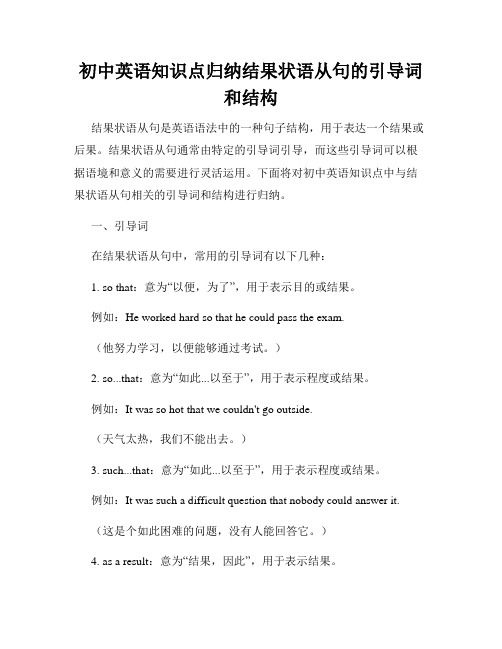
初中英语知识点归纳结果状语从句的引导词和结构结果状语从句是英语语法中的一种句子结构,用于表达一个结果或后果。
结果状语从句通常由特定的引导词引导,而这些引导词可以根据语境和意义的需要进行灵活运用。
下面将对初中英语知识点中与结果状语从句相关的引导词和结构进行归纳。
一、引导词在结果状语从句中,常用的引导词有以下几种:1. so that:意为“以便,为了”,用于表示目的或结果。
例如:He worked hard so that he could pass the exam.(他努力学习,以便能够通过考试。
)2. so...that:意为“如此...以至于”,用于表示程度或结果。
例如:It was so hot that we couldn't go outside.(天气太热,我们不能出去。
)3. such...that:意为“如此...以至于”,用于表示程度或结果。
例如:It was such a difficult question that nobody could answer it.(这是个如此困难的问题,没有人能回答它。
)4. as a result:意为“结果,因此”,用于表示结果。
(他没有为考试学习,结果他失败了。
)5. therefore:意为“因此,所以”,用于表示结果。
例如:The weather was bad, therefore, the game was canceled.(天气不好,因此比赛被取消了。
)二、结构在结果状语从句中,常用的结构有以下几种:1. 主语+谓语+so that+主语+谓语例如:She studies hard so that she can get good grades.(她努力学习,以便能够获得好成绩。
)2. 主语+谓语+such...that+句子例如:The movie was such an exciting one that everyone loved it.(这部电影如此激动人心,每个人都喜欢它。
初中英语知识点归纳结果状语从句的引导词
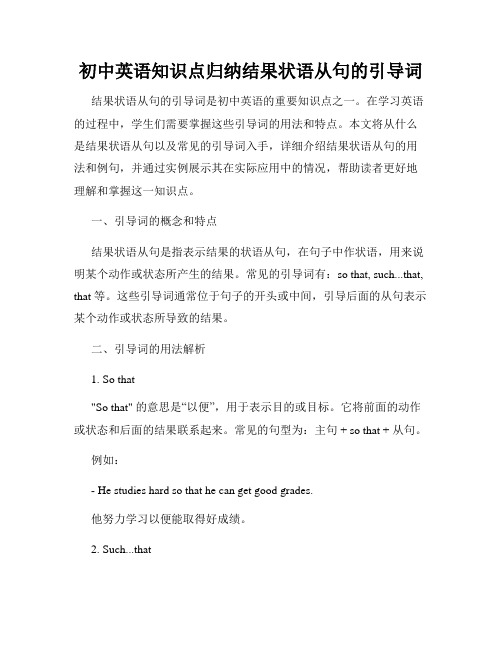
初中英语知识点归纳结果状语从句的引导词结果状语从句的引导词是初中英语的重要知识点之一。
在学习英语的过程中,学生们需要掌握这些引导词的用法和特点。
本文将从什么是结果状语从句以及常见的引导词入手,详细介绍结果状语从句的用法和例句,并通过实例展示其在实际应用中的情况,帮助读者更好地理解和掌握这一知识点。
一、引导词的概念和特点结果状语从句是指表示结果的状语从句,在句子中作状语,用来说明某个动作或状态所产生的结果。
常见的引导词有:so that, such...that, that 等。
这些引导词通常位于句子的开头或中间,引导后面的从句表示某个动作或状态所导致的结果。
二、引导词的用法解析1. So that"So that" 的意思是“以便”,用于表示目的或目标。
它将前面的动作或状态和后面的结果联系起来。
常见的句型为:主句 + so that + 从句。
例如:- He studies hard so that he can get good grades.他努力学习以便能取得好成绩。
2. Such...that"Such...that" 的意思是“如此...以至于”,用于表示结果的程度或强调。
其中“such”用于修饰名词,"that"引导结果状语从句。
常见的句型为:such + 形容词 + 名词 + that + 从句。
例如:- She is such a good singer that she won the first prize.她是如此出色的歌手,以至于她赢得了第一名。
3. That"That"在结果状语从句中的用法比较灵活,可以引导多种类型的句子。
它用于表示结果、程度、原因等。
常见的句型包括:主句 + that +从句,too + 形容词/副词 + that + 从句,enough + 形容词/副词 + that +从句等。
初中英语语法课件-结果状语从句

The End
such + (形容词)+ 不可数名词 + that从句 It is such good weather that we want to go out to play. 天气如此好,以至于我们想去外面玩。
TIP: 为了强调形容词或副词,so/such...that...引导的结果状语从句可把so/such 置于句首,主句用倒装语序。 So excited was he that he could not fall into sleep. 他太激动了不能入睡。 So carelessly did he drive that he nearly got killed. 他开车如此粗心差点丧命。 Such good news did we get that everyone was excited. 我们得到这么好的消息,以致每个人都很兴奋。
2. such(...) that...引导的结果状语从句
such + a/an +(形容词)+ 可数名词单数 + that从句
He is such an excellent student that every teacher likes him. 他是如此优秀的一个学生以至于每个老师都喜欢他。 He is such a little boy that he can't lift the box. 他是这么小的孩子,提不起那个箱子。
1) so that引导的结果状语从句 In his fury, he threw the vase upon the ground so (that) they were broken. 他盛怒之下,便把花瓶扔到地上,摔破了。
We moved to the country so that we were away from the noisy and dull city. 我们搬到了乡下,所以我们远离了喧嚣、单调的城市。 She is ill so that she can't attend the meeting this afternoon. 她病了,不能参加今天下午的会议了。
初中英语知识点归纳结果状语从句的用法
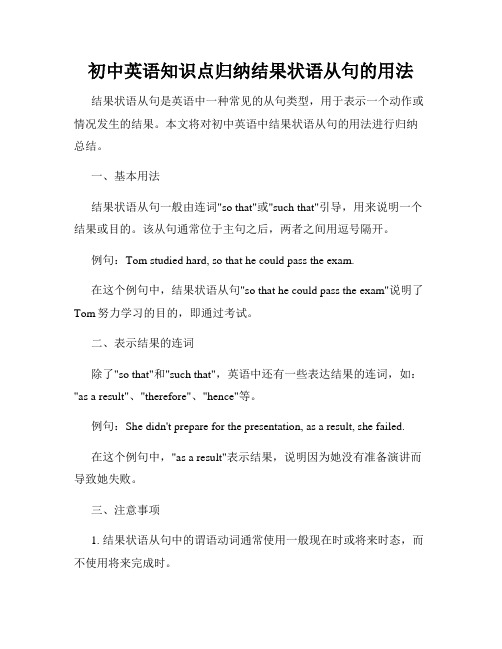
初中英语知识点归纳结果状语从句的用法结果状语从句是英语中一种常见的从句类型,用于表示一个动作或情况发生的结果。
本文将对初中英语中结果状语从句的用法进行归纳总结。
一、基本用法结果状语从句一般由连词"so that"或"such that"引导,用来说明一个结果或目的。
该从句通常位于主句之后,两者之间用逗号隔开。
例句:Tom studied hard, so that he could pass the exam.在这个例句中,结果状语从句"so that he could pass the exam"说明了Tom努力学习的目的,即通过考试。
二、表示结果的连词除了"so that"和"such that",英语中还有一些表达结果的连词,如:"as a result"、"therefore"、"hence"等。
例句:She didn't prepare for the presentation, as a result, she failed.在这个例句中,"as a result"表示结果,说明因为她没有准备演讲而导致她失败。
三、注意事项1. 结果状语从句中的谓语动词通常使用一般现在时或将来时态,而不使用将来完成时。
例句:He worked hard so that he can buy a new car.在这个例句中,"can"使用了一般现在时,表示他努力工作的目的是为了买一辆新车。
2. 当主句的谓语动词是“think”、“believe”、“suppose”等表示观点或看法的动词时,结果状语从句中可以使用一般现在时来表示将来的动作或情况。
例句:I will go to the library tomorrow. I think it will be closed.在这个例句中,主句中的"think"表示说话人的主观看法,结果状语从句"it will be closed"中使用了一般现在时来表示将来的动作。
- 1、下载文档前请自行甄别文档内容的完整性,平台不提供额外的编辑、内容补充、找答案等附加服务。
- 2、"仅部分预览"的文档,不可在线预览部分如存在完整性等问题,可反馈申请退款(可完整预览的文档不适用该条件!)。
- 3、如文档侵犯您的权益,请联系客服反馈,我们会尽快为您处理(人工客服工作时间:9:00-18:30)。
初二英语第十三&十四讲目的与结果状语从句So that(以便),in order that(以便),in case(以免/以防)可以引导目的状语从句。
e.g.: They got up early so that they could catch the early bus.So that从句和in order that从句在主从句主语统一的情况下可以转换成in order to或so as to 不定式。
e.g.: They got up early so that they could catch the early bus. 注意:若主从句的主语不统→They got up early so as to/in order to catch they early bus.一,就不能相互转换。
You’d better put on more clothes in case you might catch cold.→You’d better put on more clothes so that you might not catch co ld.注意:目的状语从句的谓语多由“情态动词+动词”构成。
Fun Station Ⅰ:( ) 1. Just tell me what subject you’d like me to talk on I could get some notes ready.a. so thatb. in order.c. sod. just as ( ) 2. She was so angry at all he was doing she walked out, and close the door.a. that, thatb. what, thatc. what, asd. that, which ( ) 3. He went home early his parents didn’t worry about him.a. in order tob. so thatc. becaused. such that( ) 4. She made a note of it she might forget.a. so thatb. in order thatc. ifd. in case★结果状语从句So...that和such...that,意为“如此...以至于”,引导结果状语从句。
e.g.: He worked so hard that he was praised.So...that和such...that的用法:(1)它们的结构分别为:So+形容词/副词+that从句Such+形容词+名词+that从句在“such+形容词+名词+that从句”这种结构中,名词若是可数名词单数,不定冠词a/an 应放在形容词的前边,即“such+ a/an+形容词+名词+that从句”。
Fun Station Ⅱ:( ) 5. She told us story that we all forgot about the time.a. such an interestingb. such interesting ac. so an interestingd. so interesting ( ) 6. He has few friends that he often feels lonely.a. suchb. soc. such ad. only a(2)so...that, such...that引导的结果状语从句可以跟enough to do相互转换,也可以与too...to 结构相互转换。
e.g.: He was so tired that he couldn’t move.→He was too tired to move.(3)so that多用于引导目的状语从句,有时候也可以引导一个结果状语从句。
它们的区别在于从句中是否有情态动词。
从句中有情态动词can, could, may, might, would, should等,表示从句谓语动作将发生在主句谓语动作之后,so that引导的是目的状语从句。
如果so that从句中没有情态动词,主从句之间是因果关系,此时的从句为结果状语从句。
e.g.: He made good use of time so that he could finish the work in time.(从句中有情态动词could, 动作将要发生,表示目的,是目的状语从句) He made good use of time, so that he finished the work in time.(从句中无情态动词,主从句之间是因果关系,是结果状语从句) Fun Station Ⅲ:( ) 7. John shut everybody out of the kitchen he could prepare his grand surprise for the party.a. whichb. whenc. so thatd. as if( ) 8. There was such a long line at the exhibition we had to wait for about half an hour.a. asb. thatc. sod. hence(4) so that 引导结果状语从句时,主从句之间通常停顿一下,有时加上一个逗号;而它引导的目的状语从句则不需如此,如以上两个例句。
( ) 1. He is so he always airs.a. pride as, flies tob. proud that, puts onc. light that, walks ond. clean as, clears the( ) 4. Read such books you can easily understand.a. asb. thatc. whichd. so( ) 6. She was so by surprise at his rudeness shed burst into tears.a. taken, thatb. taken, whenc. made, thatd. made, when ( ) 8. You can go out you promise to be back before 10 o’clock.a. in caseb. so long asc. so thatd. as far as( ) 10. I hurried I wouldn’t be late for class.a. sinceb. so thatc. as ifd. unless( ) 11. Write clearly your teacher can understand you correctly.a. forb. thenc. so thatd. because( ) 12. He made great progress we were all very happy.a. as, thatb. so, asc. such, thatd. so, that( ) 13. The old man was tired he couldn’t work any longer.a. so, thatb. both, andc. either, ord. not only, but also ( ) 14. I sit in the front of the classroom I can hear clearly.a. sinceb. so thatc. asd. so( ) 15. Let’s get up earlier we can get to school in time.a. asb. thanc. so thatd. in order( ) 16. Look after the children I am out.a. thoughb. so thatc. such thatd. while( ) 17. Please speak loudly I can hear a little better.a. thoughb. so thatc. befored. as ( ) 18. Please answer the question in a loud enough voice all the class may hear.a. so, thatb. so thatc. andd. or ( ) 19. Lucy always takes a seat in the first row she can hear better.a. sob. so thatc. in order tod. buts ( ) 20. They were hurrying they wouldn’t miss the plane.a. sob. in order toc. so thatd. as ( ) 21. The foreign visitor spoke his interpreter could hardly catch his words.a. such fast thatb. so fastc. so fast thatd. so fastly that( ) 22. They have started a technical training course the workers attend it duringtheir spare time.a. in order to; mayb. in order that; mayc. so as to; shouldd. so that; might( ) 24. The research is so designed that once nothing can be done to change it.a. beginsb. having begunc. beginningd. begun ( ) 26. You can have this magazine I finish reading ita. so thatb. becausec. unlessd. the moment( ) 27. She wrote down his address and telephone number in her notebook carefully she might not forget.a. so asb. in orderc. in cased. so that ( ) 28. He was angry to hear the news that he couldn’t say a word.a. sob. tooc. veryd. much( ) 29. He saves money he can buy some birthday presents for his mother.a. sob. so thatc. such thatd. in order( ) 30. –Must you leave now?-I’m afraid so. It’s late that I can’t get up on time tomorrow morning.a. veryb. quitec. tood. so ( ) 31. The Dead Sea is salty swimmers can’t sink.a. so, thatb. too, toc. such, thatd. enough, to( ) 32. The driver hurt the girl__ _badly _______ she had to see a doctor.a. so ,that b .either, or c. too, to d .neither, nor ( ) 33. She was _____ tired _____ she could not move an inch.a. so, thatb. such, thatc. very, thatd. so, as ( ) 34. Bring it nearer _____ I may see it better.a. althoughb. even thoughc. so thatd. since ( ) 35. Helen listened carefully _____ she might discover exactly what she needed.a. in thatb. in order thatc. in cased. even though( ) 36. Peter has changed so much we can hardly recognize him.a. asb. so thatc. thatd. but ( ) 37. I made terrible mistake that everybody was surprised.a. so ab. such ac. so thed. suchthe( ) 38. There is that we can’t finish it in two days.a. so many workb. so much workc. such many workd. such much work( ) 39. May I sit nearer ___ I can see more clearly?a. as ifb. so thatc. even ifd. so ( ) 40. Lift it up ___ I may see it.a. thoughb. so thatc. asd. than ( ) 41. We should go by bus ___ we can get there earlier.a. as soon asb. wherec. in order thatd. as ( ) 42. I got there ___ late ___ I didn't see him.a. too; tob. such; thatc. so; thatd. so; as ( ) 43. It is ___ hot in the room ___ we have to go out for a walk.a. such; thatb. so; thatc. as; asd. such; as ( ) 44. He has___ an interesting book that we want to read it.a. sob. suchc. the samed. as。
